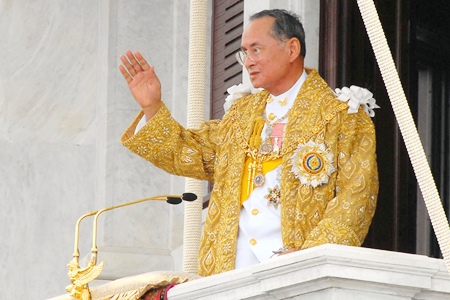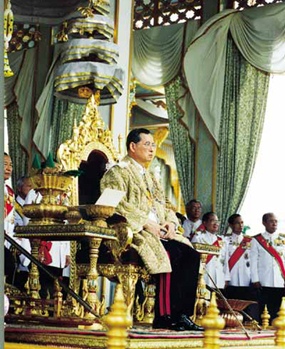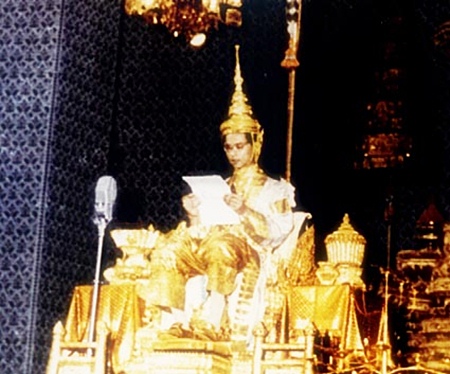Thursday, May 5 marks the 61st anniversary of the Coronation of His Majesty King Bhumibol Adulyadej the Great. The day is celebrated as a national holiday, and as such all government offices and commercial banks will close for the day.
Whist being crowned King of Thailand, His Majesty King Bhumibol Adulyadej the Great took a sacred oath to rule with Righteousness, for the Benefit and Happiness of the Thai people, which He has done magnificently, garnering tremendous respect from His people. HM King Bhumibol Adulyadej the Great is the longest reigning monarch in the world. Long Live the King!
 Pattaya Mail Media joins with the Kingdom of Thailand in joyously celebrating Wan Chatramongkhol, His Majesty King Bhumibol Adulyadej the Great’s Coronation Day on Thursday, May 5. Long Live the King! The day is celebrated as a national holiday, and as such all government offices and commercial banks will close for the day. (Photo courtesy of the Bureau of the Royal Household)
Pattaya Mail Media joins with the Kingdom of Thailand in joyously celebrating Wan Chatramongkhol, His Majesty King Bhumibol Adulyadej the Great’s Coronation Day on Thursday, May 5. Long Live the King! The day is celebrated as a national holiday, and as such all government offices and commercial banks will close for the day. (Photo courtesy of the Bureau of the Royal Household)
Each year on the 5th of May, the Kingdom of Thailand commemorates the day when, in 1950, the Coronation Ceremony was held for His Majesty King Bhumibol Adulyadej the Great, the 9th in the Chakri Dynasty (Rama IX).
HM the King, after studying in Europe, returned to Thailand and was crowned King during an elaborate and highly intricate ceremony that out lavished all previous coronations in Thailand.
 (Photo courtesy of the Bureau of the Royal Household)
(Photo courtesy of the Bureau of the Royal Household)
A week prior to His being crowned King, on April 28, 1950, H.M. King Bhumibol and Mom Rajawongse Sirikit Kitayakara were married. Following the Coronation, HM the King returned to Switzerland to continue studying.
The Coronation Ceremony reinforces the stature of the Kings of Thailand. The first such elaborate ceremony was performed when Pho Khun Phamuang succeeded Pho Khun Bangklangthao as the ruling King of Muang Sukhothai. Phaya Lithai, a former leader in Sukhothai, left a historical record in stone describing the coronation ceremony in Sukhothai at Wat Srikhum.
In the beginning of the Ratanakosin era, the first King in the Chakri Dynasty (HM King Buddhayodfa the Great) took the title of Rama I and moved the capital of Siam from Thonburi to the opposite bank of the Chao Phraya River, and constructed Krung Ratanakosin (Bangkok). In the process of building the Royal Palace and Wat Phra Kaew (Temple of the Emerald Buddha) the first King in the House of Chakri refined the coronation ceremony, establishing important protocol that has lasted to this day. All Kings to follow not undergoing the coronation ceremony would be unable to assume the term “Phrabat” in front of the King’s title of “Somdej Phrachaoyuhua”, and more significantly, the symbol of the nine-tiered umbrella would also not be permissible or officially recognized.
The elaborate coronation ceremony of His Majesty King Bhumibol Adulyadej the Great included all the ancient rituals required for assuming the full title and the nine-tiered umbrella. HM King Bhumibol Adulyadej then bestowed the honor posthumously on His brother HM King Ananda Mahidol. HM King Bhumibol Adulyadej’s benevolent act raised HM King Ananda Mahidol’s regal status from seven to a nine-tiered umbrella.
During the reign of HM King Mongkut (Rama IV), Buddhist monks and Brahmin priests were incorporated into the coronation ceremony to conduct rituals to sanctify the auspicious occasion. Previously the ceremony was arranged and conducted by the Royal Palace staff and members of the Royal Household.
The annual coronation ceremony is currently a three-day affair, starting with a ritual “tham boon” ceremony on May 3 to honor the King’s ancestors. Later on the first day, another ceremony is performed, whereby flags of honor are issued to distinguish various military units.
The following day, Buddhist ceremonies continue with chanting rituals, prayers and Brahman priests announcing the auspicious occasion forthcoming the next day (May 5).
 (Photo courtesy of the Bureau of the Royal Household)
(Photo courtesy of the Bureau of the Royal Household)
On the 5th of May, His Majesty traditionally conducts a merit making ceremony, presenting offerings to Buddhist monks, and leads a “Wien Thien” ceremony, walking three times around sacred grounds at the Temple of the Emerald Buddha.
In the evening, traditionally HM the King conducts another sacred ceremony: changing the yellow cloth on the Emerald Buddha, the guardian symbol protecting the Thai people, which was transferred from Thonburi to Wat Phra Kaew by Rama I.
Many rooms in the Royal Palace are opened for public viewing on Coronation Day. Auspicious ceremonies are performed and displays depicting Royal achievements are exhibited to reconfirm the King’s stature.




